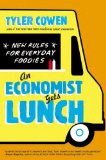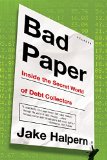Summary | Excerpt | Reviews | Beyond the book | Read-Alikes | Genres & Themes | Author Bio

New Rules for Everyday Foodies
by Tyler CowenTyler Cowen's book, An Economist Gets Lunch, is a sprawling romp through the world of contemporary American food. His subjects and ideas range from the belief that expensive food does not necessarily equal good food and that Americans should patronize a range of culturally diverse restaurants, to the notion that Asian supermarkets ought to be frequented in lieu of farmer's markets and that microwaves receive an undeserved bad reputation. Whereas books like Michael Pollan's In Defense of Food can be summed up succinctly (in Pollan's case, "Eat food. Not too much. Mostly plants."), Cowen's take on food culture is surprisingly diffuse and diluted, though it stands out as a proponent of ethnic dining.
Portions of An Economist Gets Lunch could be excerpted to make wonderful editorials because Cowen's chapters are crafted as fairly self-sustaining entities (which makes the book very easy to read). The best sections recount his culinary experiences while traveling and are blended with advice for choosing the best ethnic dining experience both at home and abroad. But when coupled together, these chapters tend to become disjointed and often lack a common argument. Cowen shifts between sections on shopping at a Chinese supermarket, to reviews of various countries' cooking styles, to political and economic arguments, to reminiscing about eating barbecue in Texas and Central America.
Given the book's catchy title, I was expecting economic analysis that demonstrates new insights about food production and value. While his research might be new to some readers - for example, the controversial idea that local food production isn't necessarily better for the environment - serious "foodies" have likely already heard and debated these issues. What saves the project are sections like "Why America Is Good at Sauce" and "At Home With Filipino" - chapters that show eaters how to uncover new flavors and cooking styles.
Cowen scorns "food snobbery" while also exhibiting strong opinions about what determines a good meal, which makes the book a bit of a logical quagmire. While I applaud Cowen's desire to enhance his diet and palate by exploring a range of dishes and cooking methods, I'm flummoxed by his simultaneous advocacy of agribusiness, genetically modified food, and plastic packaging. Cowen's perspective as an economist often feels forced, as if he perceives the need to rely on his established credibility in economics to prove his potential credibility as a food writer. That said, Cowen hits his stride when discussing his ethnic dining experiences and cooking tips, and the pages fly by. These sections are truly great, and I wish there were more of them.
I read the chapters on international cooking and dining with pleasure. Cowen is apt in his assertion that Americans do not enjoy enough good, authentic ethnic food, and his strategies for exploring culturally diverse dining options are quirky and interesting. From Vietnamese sauces to Nicaraguan barbecue, Cowen covers the nuances of different cuisines: what price points are the best for particular cultures, what ingredients to look for in certain countries, what historical or social movements make a given cuisine delicious in one region and subpar in the next. His advice far surpasses that of a travel guide. Perhaps the richness of this section is inspired by Cowen's ethnic dining blog, which is a worthy resource on its own, particularly for residents of the Washington DC metropolitan area.
An Economist Gets Lunch demonstrates Cowen's depth of knowledge about a wide variety of food and cooking styles, but it does not show off his ability to construct a succinct argument and compelling narrative. I recommend it for those who are interested in expanding their diets to incorporate a wider range of international dishes and are unsure of or intimidated by the process. For those who already frequent establishments like the Bolivian, North Korean, and Pakistani restaurants that Cowen appreciates, this book will offer a culinary comrade and add another layer of detail to dining experiences. Despite the book's subtitle that proclaims otherwise, Cowen speaks to the consumer who does not identify as a "foodie" but who likes to eat, and wants to eat more than meat and potatoes.
![]() This review was originally published in The BookBrowse Review in May 2012, and has been updated for the
March 2013 edition.
Click here to go to this issue.
This review was originally published in The BookBrowse Review in May 2012, and has been updated for the
March 2013 edition.
Click here to go to this issue.

If you liked An Economist Gets Lunch, try these:

by Carolyn Phillips
Published 2021
Part memoir of life in Taiwan, part love story―a beautifully told account of China's brilliant cuisines…with recipes.

by Jake Halpern
Published 2015
A vital exposé that is also a bravura feat of storytelling.






Your guide toexceptional books
BookBrowse seeks out and recommends the best in contemporary fiction and nonfiction—books that not only engage and entertain but also deepen our understanding of ourselves and the world around us.